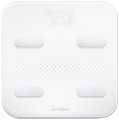Max. measurement weight
The largest weight that is allowed to be placed on the platform of this scale model. If this parameter is exceeded, the scales, at best, will not be able to show the correct data, at worst, they will completely fail. Obviously, the maximum weight is directly related to the purpose, but even kitchen scales can weigh both
up to 5 kg and up to 20 kg.
Actually, floor scales have the largest maximum measurement weight, in such models it can reach
200 kg or even more. And the most delicate are
jewelry models (refer to "Type"). Also note that in mechanical devices (refer to "Mechanism") the scale is usually graduated to the maximum weight.
Now on the market there are scales with such a maximum weight:
up to 1 kg,
up to 5 kg,
up to 10 kg,
up to 50 kg,
up to 150 kg,
up to 200 kg.
Units of measurement
Weights are able to keep records in various units of measurement, while accounting can be done both by mass and by volume. Among the most common units of measurement, we highlight the following.
— Grams (g) — a unit of weight that belongs to the metric system. Grams are used in desktop kitchen scales.
— Kilograms (kg) — a unit of weight that belongs to the metric system. Kilograms are used in floor weighing equipment.
— Pounds (lb:oz) is a common unit of weight used in some countries in Europe, as well as in the United States. 1 pound can be equated to 0.45 kilograms.
— Milliliters (ml) — a unit of volume that belongs to the metric system. Some models of scales are able to determine the volume of milk and water based on mass.
— Ounces (fl'oz) is a unit of volume used in English-speaking countries. 1 US ounce is equivalent to 30 mL.
— Stones (st) is the British unit of weight. Stones are used to take into account the mass of the human body, so this measurement system is found in floor household and specialized diagnostic scales. 1 stone can be equated to 6.35 kilograms.
Power source
The vast majority of electronic scales are powered by a battery pack. But some models may have a
built-in battery, which does not require constant replacement. Just remember to recharge the scales.
Battery powered scales can use different types of batteries:
—
AA — the format of the classic "finger" batteries;
—
AAA — "microfinger" batteries;
—
CR2032 — the so-called coin type. Many PC users are familiar with this battery format. "Coins" are used to power BIOS memory in motherboards.
In addition to the type of batteries, you also need to pay attention to their number in the battery compartment.

